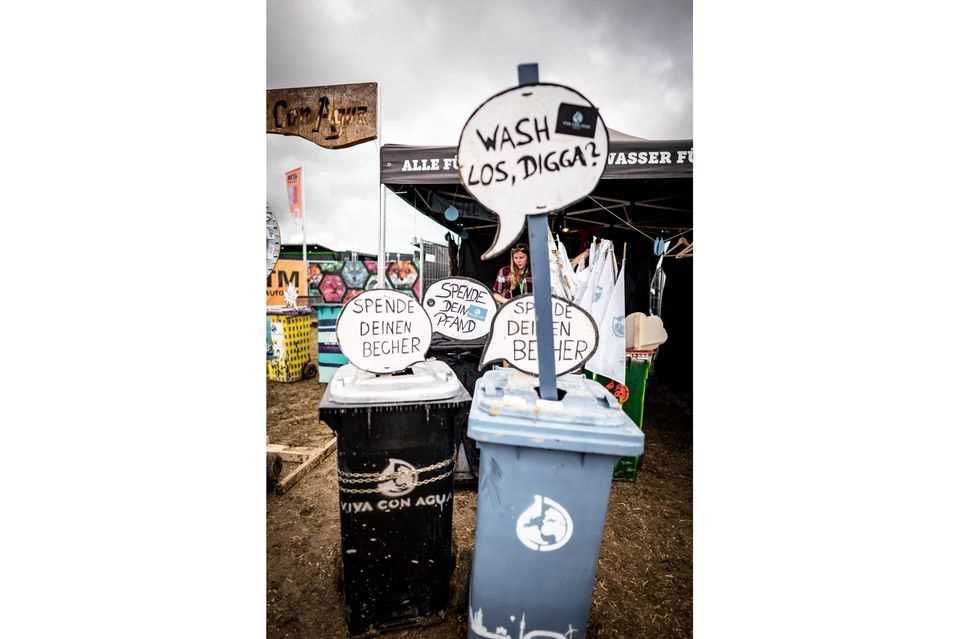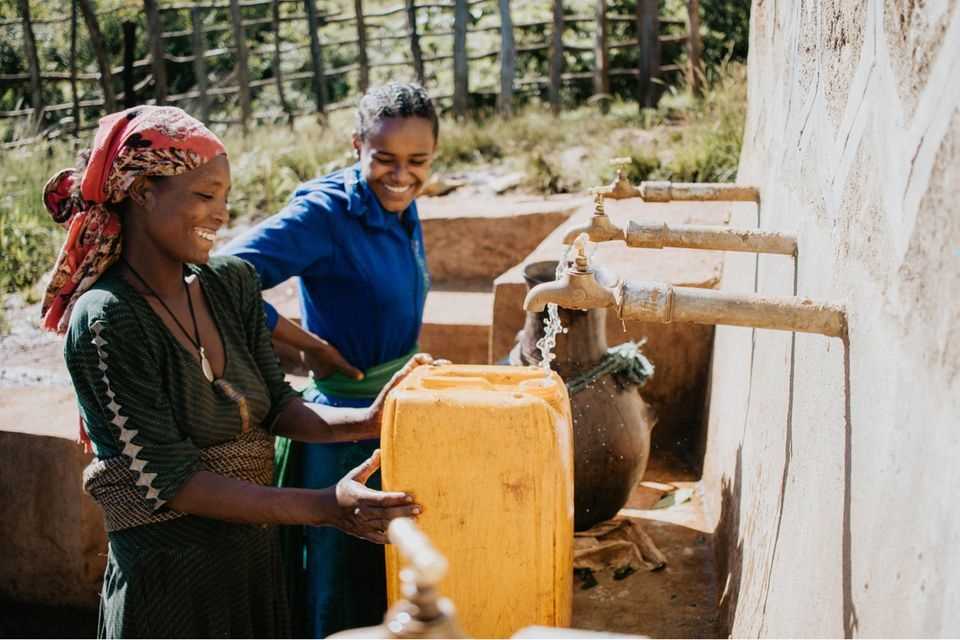Viva con Agua stands for the vision “Water for everyone – everyone for water”. How this principle can be achieved and why access to clean drinking water means female empowerment, you can find out here in the interview!
Viva con Agua is a non-profit organization that advocates access to clean drinking water and basic sanitation worldwide with a focus on the global south. Brigitte.de spoke with the managing director Carolin Stüdemann about the vision of Viva con Agua as well as positive activism and why the organization makes an important contribution to self-determination, especially for women and girls.
Dear Carolin, “Water for everyone – everyone for water” – can you explain this motto of Viva con Agua a little more precisely?
Viva con Agua advocates access to clean drinking water. We have summarized it in such a short slogan to get our vision to the point. Basically, everything revolves around water for us: Without water, a dignified life is simply not possible. Everyone needs clean drinking water to stay healthy and to create good living conditions – all of this is very closely related to water as a source of life. Our slogan contains two parts: on the one hand, “water for all” addresses our core topic – the other way round, “all for water” stands for our vision that changes can only be achieved if we manage to build a community that can working together for this vital resource.
How did your vision come about?
In 2006, our founder Benjamin Adrion was in a training camp in Cuba with his then football club St. Pauli. There he became very aware of the topic of water and then founded Viva con Agua with the aim of giving everyone access to clean drinking water. Since then the organization has grown more and more. We now have almost 10,000 volunteers across Germany who are committed to Viva con Agua. In addition, we now have a network that extends from Switzerland to Uganda and South Africa.
Viva con Agua stands for positive activism and reaches people through music, sports and art events. How do you work exactly and can you describe some of the creative ways you draw people’s attention to Viva con Agua?
Positive activism is exactly the right keyword: Our goal is to get people into positive engagement. For us, engagement always begins with some form of activation, ie first getting into action. We are z. B. on festivals or events where it is possible to support Viva con Agua very low-threshold, z. B. in the form of a deposit cup donation. In addition to donating a deposit cup, you can also find out more at an information stand or take part in a campaign. The volunteer supporters organize e.g. B. Round table tennis tournaments, flea markets, baking promotions or running dinners. There are also larger sports events or sofa concerts with famous artists who play in people’s living rooms at home. This is then streamed live and donations are generated through it. Viva con Agua wants to connect people and collect donations through fun and creative activities. We generally work very action-oriented. Through a positive initial contact, people want to find out more about the global drinking water situation and to be permanently committed to clean drinking water. We believe that change is possible through joy: Especially when people have fun in what they are doing. We want to avoid donations out of shame or a guilty conscience, because we believe that it will not lead to long-term change.

© Markus Schwer for Viva con Agua
The Viva con Agua mineral water bottles are available in stores and restaurants. What’s the story behind the bottles?
Years ago we realized that the whole drinking water market is difficult: water is imported and transported over long distances. A lot of money is made with this good – but this in turn is not used for global equilibrium. Water is a human right and should be accessible to everyone. We want to share with everyone this privilege that we have clean drinking water from the tap in this country and that we don’t have to worry about. The Viva con Agua mineral water contributes financially to the fact that water projects can be implemented: z. For example, the money is used for building wells or for school workshops on the subject of hygiene. The consumption of the product generates long-term sustainable added value. In addition: When the water is in the restaurant, we draw attention to the topic and raise awareness of it. The bottles are a kind of “liquid flyer”.
You can read a lot about WASH projects on your website. Can you briefly explain the abbreviation WASH?
WASH stands for water, sanitation and hygiene. In order for clean drinking water to remain clean in the long term, the other two components are always required: hygiene and sanitary facilities. That is why we do in schools e.g. B. also hygiene workshops, especially with children and adolescents, to raise awareness of this topic. This is an important task for us, especially now in times of corona, in order to ensure health protection. But sanitation is also of central importance. For example, if there are no toilets in a region, faeces pollute the groundwater, which in turn leads to health problems. That is why, for us, these three components always belong together in our projects.
In the global south it is mainly girls and women who suffer from inadequate water access and a lack of sanitary facilities. Can you describe in more detail the problems they face?
On the one hand, women and girls are in most cases primarily responsible for ensuring the water supply in the house. The women and girls do not have the time they have to spend to pursue a job or to take part in education. Accordingly, access to clean drinking water helps empower women and girls. On the other hand, the issue of menstrual hygiene must be addressed here: women and girls who have their periods are often unable to attend school during this time because there are insufficient sanitary facilities. That is a lot of time per month, which can mean that girls have to drop out of school, for example because they can no longer keep up or the issue of periods is stigmatized. That is why menstrual hygiene is a component in our projects that we take into account in the implementation.

© Lea May for Viva con Agua
With your work you make an important contribution to female empowerment. Can you give an example of what you have already achieved with your work?
I immediately think of an example in Mozambique: We have been working on a project there for a long time. The basis has already been laid there: there is access to clean drinking water, sanitary facilities and hygiene. At the same time, however, we have to ensure that the water infrastructure remains in place over the long term and in a sustainable manner. A water committee was set up there for this purpose: the members are trained so that they can carry out repairs to the infrastructure themselves. The committee also ensures that a water usage fee is collected from all villagers. So if the well breaks, spare parts can be bought. The chairmen of this water committee are all female – absolute power women who feel connected and responsible for the water infrastructure. As a result, they have increased their reputation in their village: They are primarily responsible for ensuring that the villagers stay healthy. Because when there are no wells, people often drink surface water, which can be contaminated with feces and lead to diarrheal diseases and, in turn, high infant mortality rates. There are projections that the deaths from diarrheal illnesses are significantly higher than from armed conflicts. Access to clean drinking water also increases the status of women who take care of it in the long term.
Especially during the corona pandemic, the need for hygiene and sanitary facilities is becoming even more urgent. At the same time, the pandemic is also hindering the way you work. What challenges did you face?
The specific challenge was in the project areas. Due to distance restrictions, we had to change our projects again: For example, if we hold hygiene workshops in schools, this had to take place in a modified form if live workshops were not possible. This then happened, for example, through comic magazines that playfully convey the subject of water or hygiene. So other ways had to be found in order to still have the educational effect.
In this country too, your positive actionism is slowed down by the lack of events. What effects are you struggling with and how are you reaching people at the moment?
In this country, where we strongly motivate people to donate through events, we have really noticed a drop in donations due to the pandemic. So we had to find new ways and have relied on small events and digital formats. So we have z. B. Made gaming tournaments in which celebrities played FIFA against each other. This was used as an opportunity for the fans to donate for clean drinking water. We also hosted an Instagram live stream over 36 hours on our Viva con Agua channel and fundraised through the art.
How can you get involved privately for Viva con Agua?
The most important support for us is the sustaining membership with which one Viva con Agua permanently supported, e.g. B. with 5 euros per month – in the end, this is the one drink per month that is not drunk and instead goes in favor of Viva con Agua. The sponsoring membership gives us a certain degree of planning security for the funding amounts.
Otherwise you can also look for the Viva con Agua flags at concerts or in the stadium of FC St. Pauli or 1. FC Nürnberg. We have deposit bins there in which the deposit can be donated or where you can talk directly about water projects. But you can also use your own birthday for donations and give guests the opportunity to donate to water projects instead of buying gifts. Actually, everything that people enjoy or that they are good at is suitable: Some make art or crochet for water and use it to generate donations for clean drinking water. Because of course we mainly need donations to implement our projects.
That sounds like creative and diverse possibilities that can be easily integrated into everyday life. Thank you very much for the interview and good luck with your future work, dear Carolin.
